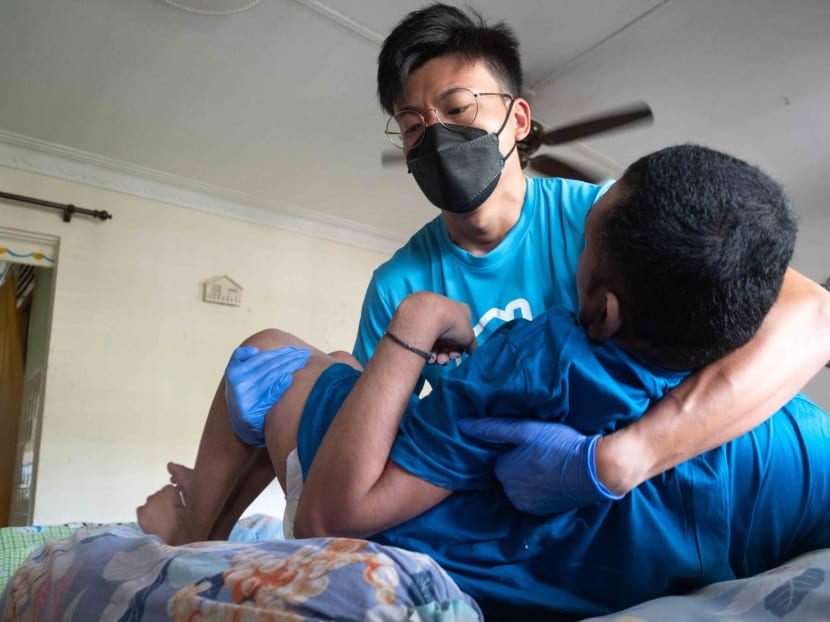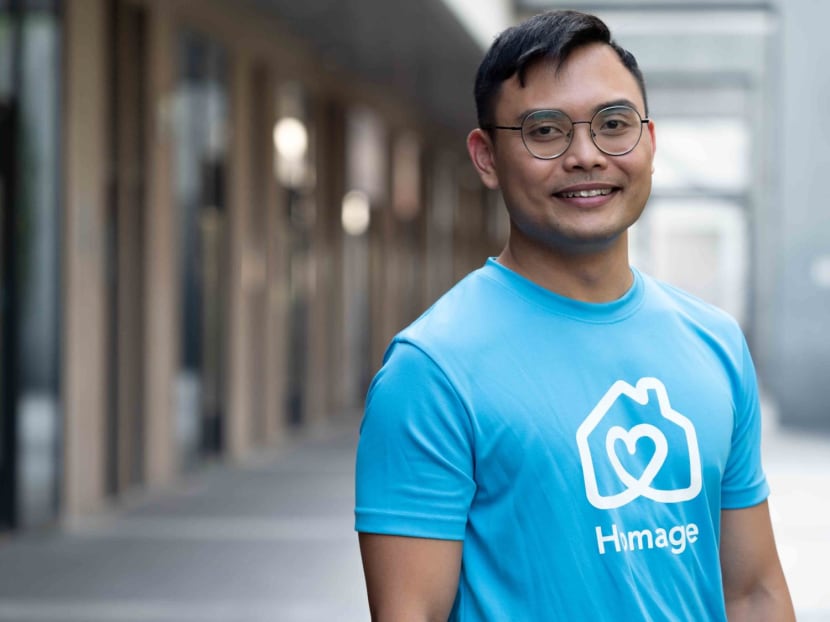More young people, especially men, joining home care industry and finding their calling
SINGAPORE — Mr Tan Wee Han left his job as a captain in the Singapore Armed Forces, where he had worked for about 11 years, to become a freelance caregiver at Homage, a company that offers home care services, in December 2021.

Mr Tan Wee Han attending to his patient.
- Companies in the home care industry said that there has been a growth in young freelance caregivers, an increasing number of whom are male
- For Mr Tan Wee Han, the job matched his sense of purpose and fulfilment
- He believes that with the wider availability of home care services these days, it is much easier to find home care professionals in a "very short amount of time"
- Mr Asy'ari Asni said that the caregiving industry needs more men as "we have the physical strength to lift patients who are heavier"
SINGAPORE — Mr Tan Wee Han left his job as a captain in the Singapore Armed Forces, where he had worked for about 11 years, to become a freelance caregiver at Homage, a company that offers home care services, in December 2021.
In fact, caregiving has "never left (his) life", he said, because he was his mother's main caregiver when she had a relapse of cancer while he was still in secondary school.
"I was the one who fetched her from the hospital. My father was working, and my brother was overseas, so juggling school assignments, school schedules and hospital trips was what I did at the time," the 32-year-old said in an interview with TODAY recently.
His mother's nose cancer resulted in her losing her eyesight and her hearing.
"We had no training, we were at a loss — we fumbled around to set up the house in the safest manner for her," said Mr Tan, who currently works around 30 to 35 hours a week at Homage.
"(This) repeated itself in university when my father was down with cancer as well," added the Nanyang Technological University alumni.
"This is what really struck me: When your closest loved ones are undergoing this, what can you do to help?"
He believes that with the wider availability of home care services these days, it is much easier to find home care professionals in a "very short amount of time".
MORE FREELANCING IN HOME CARE INDUSTRY
There are no statistics on the total number of professional caregivers in Singapore, or a breakdown of their ages or gender types.
But anecdotally, the number of young people freelancing in the home care industry is growing.
A spokesperson for Caregiver Asia said the online portal for healthcare services saw a 20 per cent increase in freelancers and part-timers from 2020 to 2022, while declining to give exact figures.
And more men are joining the industry "as gender-specific perceptions towards caregiving shift", Homage added.
This coincides with the fact that there has been an increase in the percentage of male nurses, according to annual releases by the Singapore Nursing Board.
The latest available statistics show that in 2021, around 12 per cent of registered nurses were male, compared to 8.5 per cent in 2011.
The difference between caregivers and nurses is that the former are "trained and certified individuals" who are equipped to assist patients with daily activities at home, according to Homage.
However, caregivers themselves may not be licensed nurses and cannot perform medical tasks such as administering medication or intravenous therapy.
Mr Tan said that he joined Homage because it matched his sense of purpose and fulfilment.
He believes he was lucky to be able to "do something that I was familiar with, and to be able to find fulfilment in that is something that I think is very special".

For Mr Asy'ari Asni, he, too, started out as a freelance caregiver at Homage in June 2017 before taking on the job full time the following year.
He still remembers his initial struggles, like how his hands were shaking when he was transferring his first client — a middle-aged man — from his wheelchair to his shower chair.
"I was afraid of dropping him," said the 35-year-old.
Mr Asy'ari said that the caregiving industry needs more men as "we have the physical strength to lift patients who are heavier".
He checks on his former patients even when they are no longer under his care.
Recalling his first patient, Mr Asy'ari said he once visited his home to follow-up as a friend and found to his shock that his wife, who was his primary caregiver as the couple had no children, was "all skin and bones".
She had end-stage breast cancer. She was living alone as her husband had been admitted to a nursing home.
"She was a shadow of her former self," Mr Asy'ari said.
"I was actually quite traumatised. I didn’t know what to do or how to comfort her."
But he said that the experience has helped him in his current work.
“Because of that experience, I can work with palliative cases very easily,” he said.
He added that he asks palliative care patients what they wish for and tries to let them do it, even if it might be unhealthy.
"You know that their time is coming soon. Let them enjoy. If they want to smoke, if they want to drink, by all means."









